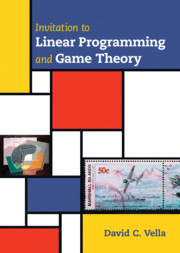Book contents
- Frontmatter
- Contents
- Preface
- Acknowledgements
- 1 Preliminaries
- 2 Matrix Algebra
- 3 Graphical Linear Programming
- 4 Sensitivity Analysis and Duality
- 5 The Simplex Algorithm
- 6 Game Theory
- 7 More Game Theory
- 8 Sensitivity Analysis, Ordinal Games, and n-Person Games
- 9 More Linear Programming
- Appendix A Rapid Review of Sets and Probability
- References
- Index
8 - Sensitivity Analysis, Ordinal Games, and n-Person Games
Published online by Cambridge University Press: 11 March 2021
- Frontmatter
- Contents
- Preface
- Acknowledgements
- 1 Preliminaries
- 2 Matrix Algebra
- 3 Graphical Linear Programming
- 4 Sensitivity Analysis and Duality
- 5 The Simplex Algorithm
- 6 Game Theory
- 7 More Game Theory
- 8 Sensitivity Analysis, Ordinal Games, and n-Person Games
- 9 More Linear Programming
- Appendix A Rapid Review of Sets and Probability
- References
- Index
Summary
In this chapter, we vary the assumptions under which we play a game, so the chapter can be regarded as a sort of sensitvity analysis of game theory. We illustrate reverse induction to solve games of perfect information if play is sequential rather than simultaneous. We also consider changes such as what happens if the players are allowed to communicate with each other or if your opponent is indifferent (such as nature) as opposed to a rational player. We consider ordinal games (where the outcomes are just ranked in order of preference rather than having numerical payoffs).Here is where we cover the famous dilemmas of game theory, such as the prisoner's dilemma, and discuss applications to politics and international relations (the arms race, the Cuban Missile Crisis, and federal government shutdowns due to budget gaps). We discuss the theory of moves, proposed by Brams in 1994 as a way of making ordinal game models more realistic, and offer our own small adjustment to this theory. We conclude the chapter with brief mention of n-person games and discuss games in characeristic function form. Examples include legislative voting systems, where we introduce power indices.
Keywords
- Type
- Chapter
- Information
- Invitation to Linear Programming and Game Theory , pp. 352 - 422Publisher: Cambridge University PressPrint publication year: 2021

